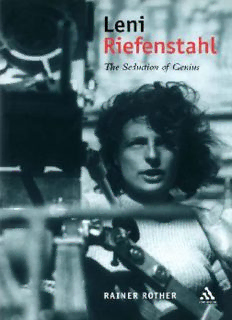
Leni Riefenstahl: The Seduction of Genius PDF
Preview Leni Riefenstahl: The Seduction of Genius
Leni Riefenstahl This page intentionally left blank Leni Riefenstahl The Seduction of Genius RAINER ROTHER Translated by Martin H. Bott continuum LONDON • NEW YORK Continuum The Tower Building 370 Lexington Avenue 11 York Road New York London SE1 7NX NY 10017-65-03 © Rainer Rother 2002 All rights reserved. No part of this publication may be reproduced or transmitted in any form or by any means, electronic or mechanical, including photocopying, recording or any information storage or retrieval system, without permission in writing from the publishers. First published in German by Henschel, Berlin 2000 as Leni Riefenstahl Die Verführung des Talents. British Library Cataloguing-in-Publication Data A catalogue record for this book is available from the British Library. ISBN 0-8264-6101-8 (hardback) Typeset by YHT Ltd, London Printed and bound in Great Britain by MPG Books Ltd, Bodmin, Cornwall Contents Translator's Preface viii Acknowledgements ix Introduction: The Problem with Leni Riefenstahl 1 Part One: The Talent 2 Beginnings 11 Overcompensation 11 The First Performance 13 An Intimation of New Grandeur in Dance 18 Her First Leading Role 22 Struggles in Snow and Ice 27 3 The Film Auteur Emerges 32 Two Interpretations of the Same Story 32 Das blaue Licht 35 Part Two: The Genius of Nazi Filmmaking 4 A New Kind of Film: Sieg des Glaubens 45 Behind the Scenes of the First Party Rally Film 46 A Party Commission: New Quality 51 Stylization and 'Spontaneity' 54 vi Contents 5 The Auteur of Nazi Filmmaking 59 The Story of the 'Movement' 61 The Party Rally Film - A Historical Document? 63 The Party Rally Narrative 64 The Film Auteur 72 Tag der Freiheit 74 6 The Best Sports Film of All Time 77 Storming to the Summit 78 A Commission 81 The Political Significance of an 'Unpolitical' Film 83 Sports and Suspense 88 7 The Function of the Genius 91 Travel Diplomacy 91 Stylized Events and 'Heroic Reportages' 94 Studio Facilities for Leni Riefenstahl 99 Part Three: Deprived of Power 8 A Partial Retreat: Tiefland 107 A Substitute for the Pet Project 109 A New Look at Familiar Territory 115 9 The Return of the Outcast 119 Scandalmongers and Court Cases 119 Relative Innocence 122 Extras from the Camp 125 The Massacre at Konskie 127 Symbolic Guilt 133 10 Projects 136 Repeating the Past 136 Africa 141 11 Legal Questions and the Question of Tact 148 Legal Claims 148 A Verdict 152 According to the Files . . . 153 Contents vii 12 A Renaissance - But No Rehabilitation 160 In the Public Eye 160 Towards Cult Status 167 13 In Conclusion: A Change of Persona 177 Notes 184 Appendices Chronology 223 Filmography 233 Bibliography 243 Index 257 Translator's Preface Some of Leni Riefenstahl's films were released in English-language versions which differed from the original in certain respects. To avoid confusion, the original German titles are used here, although a 'courtesy translation' is provided on the first mention of each film (and in the Filmography). Reference is also made to English- language versions where relevant. Translations of the dialogue or captions are my own. Similarly, for the sake of authenticity, I have translated all other German quotations myself, even where published English transla- tions of the text in question are available. The German sources are therefore listed in the Bibliography (which also specifies the archival sources used). Where English translations of important material exist - Riefenstahl's memoirs are the most notable example - this is made clear on the first mention in the text or notes. Readers should note, however, that Sieve of Time, the translation of Riefenstahl's memoirs published in the United Kingdom by Quartet Books, omits some sections of the original text. Courtesy translations for the titles of German articles and books cited in the text or notes are supplied wherever their meaning is relevant. Quotations from texts written in English are, of course, from the original and cited accordingly. I am indebted to Rainer Rother for his friendly and remarkably rapid responses to my queries during the closing stages of my work on his book, and to Pilar for her invaluable help and encouragement. Martin H. Bott Zurich, April 2002 Acknowledgements This book could not have been written without various kinds of help and advice from institutions, colleagues and friends. I would like to thank them all. The Friedrich-Wilhelm-Murnau-Stiftung enabled me to view films; I am particularly grateful to Gudrun Weiss and the Munich Filmmuseum, the Deutsches Filminstitut, the Stiftung Deutsche Kinemathek and the Bundesarchiv-Filmarchiv, where I was able to view copies from the collections. I also received tremendous support whilst researching texts and photographs, in particular from Claudia Dillmann and Rudiger Koschnitzky (Deutsches Filminstitut), Hans-Michael Bock and the CineGraph team (Hamburgisches Centrum fur Filmforschung), Elke Schieber (Filmmuseum Potsdam), Hans Helmut Prinzler, Frau Orluc, Eva Orbanz and Wolfgang Jacobsen (Stiftung Deutsche Kinemathek), Karl Griep, Helmut Morsbach, Martina Werth-Mühl and Evelyn Hampicke (Bundesarchiv-Filmarchiv), Stefan Drossier, Gerhard Ullmann and Klaus Volkmer (Filmmuseum München), Irmgard Bartel (Friedrich-Ebert-Stiftung), Loy Arnold and Mark Grünthal (Transit-Film), Dr Franz-Josef Kos and Herr Dr von Boeselager (German Foreign Ministry), Kapitánleutnant Dirk Steffen (Militargeschichtliches Forschungsamt Potsdam), Herr Hinze and Frau Heidemann (the Bauer Verlag's archive), Herr Dr Luchterhand (Landesarchiv Berlin), Herr Dr Gschaid (Bayerisches Hauptstaatsarchiv), Jan-Walther Hennig and Bernd Michael Finke (NDR), Herr Knuth and Dr Michael Crone (Hessischer Rundfunk), Herr Person (Sudwestrundfunk), Walter Roller (Deutsches Rund- funkarchiv), Dr. Jiirgen Zimmer (Kunstbibliothek SMPK).
Description: